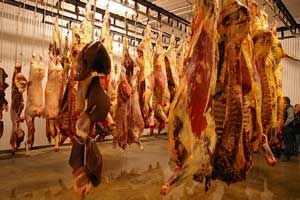USDA Inspector General Only Penalizes Less Than 1% Of Humane Act Violators

More than 150 million cows and pigs are killed in slaughterhouses across the nation. Although there are laws in place to ensure that animals are not tortured before death and that killed animals are both cleaned properly and disease-free, the Food Safety and Inspection Service (FSIS) does not meaningfully attempt to uphold that law, a recent report by the U.S. Department of Agriculture's (USDA) Office of the Inspector General claims.
The Humane Slaughter Act was passed in 1958 to prevent slaughterers from being unnecessarily cruel to animals before they were killed. In 1978, the USDA inspectors were given authority to stop the slaughter line if they witnessed brutality. The USDA launched a pilot program 15 years ago to prevent unnecessary or excess inspecting to ensure slaughters occurred in a timely fashion, run by the FSIS.
A major flaw with the program is that it was not monitored for efficacy and now, many slaughterhouses across the country have accrued hundreds of violations regarding animal slaughter and food safety regulations, but are still open and providing meat to the general public because the FSIS refuses to see its oversight.
Instead, plants with health and safety violations, like an Indiana slaughterhouse that shot a conscious pig numerous times along with an electric stunner to knock the suffering animal unconscious, are still open and running with no penalty. This is not the most grotesque of the violations. A Nebraska slaughterhouse has 50 repeated violations, out of 600 total violations, for having carcasses contaminated with fecal matter on site.
The issue is not merely the unclean and inhumane practices at slaughterhouses, but also the inspectors who turn the other cheek. The USDA's Office of the Inspector General interviewed 39 slaughterhouse inspectors and one-third admitted they did not report a slaughterhouse if they witnessed a conscious animal on a bleeding rail, where animals should already be dead or subdued. This offense legally requires suspension of the inspector. However, these inspectors slip through the cracks because of the Act's rules about quick slaughter and fewer inspections.
Out of 44,128 identified violations of food safety laws at 616 slaughterhouses, only 28 resulted in plant suspensions. The oversight of the FSIS and the USDA can lead to serious health and animal welfare issues since so many have had violations and only less than than percent of slaughterhouses were penalized.
The pilot program and slaughterhouses are not at all monitored. As a result, the Centers for Disease Control report that there are tens of millions of cases of food poisoning annually that result in hospitalizations and deaths.



























